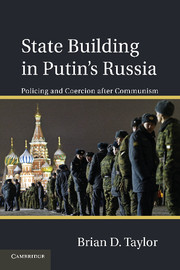Book contents
- Frontmatter
- Contents
- List of Figures, Tables, and Maps
- List of Abbreviations
- Acknowledgments
- Note on Transliteration and Translation
- Introduction
- 1 Bringing the Gun Back In
- 2 The Power Ministries and the Siloviki
- 3 Coercion and Capacity
- 4 Coercion and Capacity
- 5 Coercion and Quality
- 6 Coercion and Quality
- 7 Coercion in the North Caucasus
- 8 State Capacity and Quality Reconsidered
- Appendix A Publication Abbreviations
- Appendix B Interview Index
- References
- Index
- References
References
Published online by Cambridge University Press: 04 February 2011
- Frontmatter
- Contents
- List of Figures, Tables, and Maps
- List of Abbreviations
- Acknowledgments
- Note on Transliteration and Translation
- Introduction
- 1 Bringing the Gun Back In
- 2 The Power Ministries and the Siloviki
- 3 Coercion and Capacity
- 4 Coercion and Capacity
- 5 Coercion and Quality
- 6 Coercion and Quality
- 7 Coercion in the North Caucasus
- 8 State Capacity and Quality Reconsidered
- Appendix A Publication Abbreviations
- Appendix B Interview Index
- References
- Index
- References
- Type
- Chapter
- Information
- State Building in Putin’s RussiaPolicing and Coercion after Communism, pp. 331 - 360Publisher: Cambridge University PressPrint publication year: 2011



